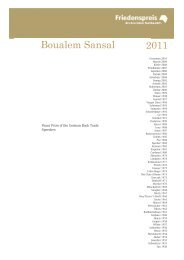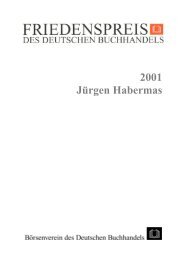2003 Susan Sontag - Friedenspreis des Deutschen Buchhandels
2003 Susan Sontag - Friedenspreis des Deutschen Buchhandels
2003 Susan Sontag - Friedenspreis des Deutschen Buchhandels
Sie wollen auch ein ePaper? Erhöhen Sie die Reichweite Ihrer Titel.
YUMPU macht aus Druck-PDFs automatisch weboptimierte ePaper, die Google liebt.
FRIEDENSPREIS DES DEUTSCHEN BUCHHANDELS<br />
and the European arts of compromise - you<br />
know the tunes.<br />
You can choreograph them differently; indeed,<br />
they have been danced with every kind of<br />
evaluation or tilt for two tumultuous centuries.<br />
Europhiles can use the venerable antitheses to<br />
identify America with commerce-driven barbarism<br />
and Europe with high culture, while the<br />
Europhobes draw on a readymade view in which<br />
America stands for idealism and openness and<br />
democracy and Europe a debilitating, snobbish<br />
refinement. Tocqueville and Lawrence observed<br />
something fiercer: not just a declaration of independence<br />
from Europe, and European values,<br />
but a steady undermining, an assassination of<br />
European values and European power. »You can<br />
never have a new thing without breaking an<br />
old,« Lawrence wrote. "Europe happened to be<br />
the old thing. America should be the new thing.<br />
The new thing is the death of the old.« America,<br />
Lawrence divined, was on a Europe-<strong>des</strong>troying<br />
mission, using democracy - particularly cultural<br />
democracy, democracy of manners - as an instrument.<br />
And when that task is accomplished,<br />
he wrote, America might well turn from democracy<br />
to something else. (What that might be is,<br />
perhaps, emerging now.)<br />
Bear with me if my references have been<br />
exclusively literary. After all, one function of<br />
literature - of important literature, of necessary<br />
literature - is to be prophetic. What we have<br />
here, writ large, is the perennial literary - or<br />
cultural - quarrel: between the ancients and the<br />
moderns.<br />
The past is (or was) Europe, and America<br />
was founded on the idea of breaking with the<br />
past, which is viewed as encumbering, stultifying,<br />
and - in its forms of deference and precedence,<br />
its standards of what is superior and what<br />
is best - fundamentally undemocratic; or »elitist,«<br />
the reigning current synonym. Those who<br />
speak for a triumphal America continue to intimate<br />
that American democracy implies repudiating<br />
Europe, and, yes, embracing a certain liberating,<br />
salutary barbarism. If, today, Europe is<br />
regarded by most Americans as more socialist<br />
than elitist, that still makes Europe, by American<br />
standards, a retrograde continent, obstinately<br />
attached to old standards: the welfare state.<br />
»Make it new« is not only a slogan for culture; it<br />
<strong>des</strong>cribes an ever-advancing, world-encompassing<br />
economic machine.<br />
However, if necessary, even the »old« can<br />
be rebaptized as the »new.«<br />
It is not a coincidence that the strongminded<br />
American Secretary of Defense tried to<br />
drive a wedge within Europe - distinguishing<br />
unforgettably between an »old« Europe (bad)<br />
and a »new« Europe (good). How did Germany,<br />
France, and Belgium come to be consigned to<br />
»old« Europe, while Spain, Italy, Poland,<br />
Ukraine, The Netherlands, Hungary, the Czech<br />
Republic, and Bulgaria find themselves part of<br />
»new« Europe? Answer: to support the United<br />
States in its present extensions of political and<br />
military power is to pass, by definition, into the<br />
more <strong>des</strong>irable category of the »new.« Whoever<br />
is with us is »new.«<br />
All modern wars, even when their motives<br />
are the traditional ones, such as territorial aggrandizement<br />
or the acquisition of scarce resources,<br />
are cast as clashes of civilizations -<br />
culture wars - with each side claiming the high<br />
ground, and characterizing the other as barbaric.<br />
The enemy is invariably a threat to »our way of<br />
life,« an infidel, a <strong>des</strong>ecrator, a polluter, a defiler<br />
of higher or better values. The current war<br />
against the very real threat posed by militant<br />
Islamic fundamentalism is a particularly clear<br />
example. What is worth remarking is that a<br />
milder version of the same terms of disparagement<br />
underlie the antagonism between Europe<br />
and America. It should also be remembered that,<br />
historically, the most virulent anti-American<br />
rhetoric ever heard in Europe - consisting essentially<br />
in the charge that Americans are barbarians<br />
- came not from the so-called left but from the<br />
extreme right. Both Hitler and Franco repeatedly<br />
inveighed against an America (and a world<br />
Jewry) engaged in polluting European civilization<br />
with its base, business values.<br />
Of course, much of European public opinion<br />
continues to admire American energy, the<br />
American version of »the modern." And, to be<br />
sure, there have always been American fellowtravelers<br />
of the European cultural ideals (one<br />
stands here before you), who find in the old arts<br />
of Europe a liberation and correction to the<br />
strenuous mercantilist biases of American culture.<br />
And there have always been the counterparts<br />
of such Americans on the European side:<br />
Europeans who are fascinated, enthralled, profoundly<br />
attracted to the United States, precisely<br />
because of its difference from Europe.<br />
What the Americans see is almost the reverse<br />
of the Europhile cliche: they see them-<br />
8










